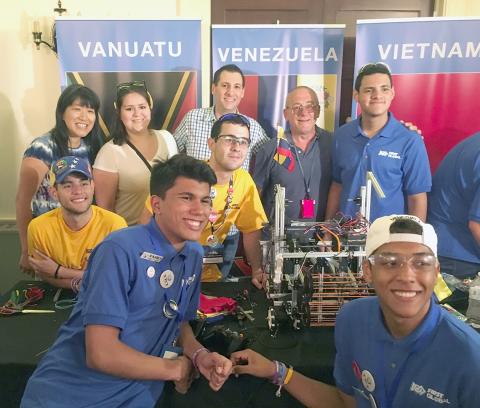NIBIB Mentors Venezuelan Team in Robotics Competition

Borrowing a tradition from the Olympic Games, the 3-day, inaugural FIRST Global Challenge robotics event got under way recently with a Parade of Nations. Competitors from more than 160 countries filed into DAR Constitution Hall in Washington, D.C., under the banners of their home countries amid cheers from an excited crowd and attentive media. The teams of college and high school students surmounted various well-publicized and lesser noted hurdles to reach the big competition.
FIRST Global is a public charity that organized the international robotics challenge to ignite passion for science, technology, engineering and mathematics—STEM—among the next generation around the world. In the first of what will be an annual meet, student teams competed with the robots they built using 2,000-piece kits provided by FIRST Global in March.
Along with shipping the robots ahead of the competition, FIRST Global also then paired each team with mentors from around the world. At NIH, the National Institute of Biomedical Imaging and Bioengineering fielded a team of remote volunteer mentors to help a student robotics team from Venezuela to design and build their robot.
NIBIB engineers, organized by Grace Peng and led by Andrew Weitz, soon became acquainted with the Venezuelans, who named their robot Venebot. The NIBIB team, which included extramural program staff and intramural scientists, provided mentorship through weekly Skype and WhatsApp meetings with the Venebot team starting in May. In addition to Peng and Weitz, NIBIB volunteers included Emily Conlan, Steve Zullo, Michael Wolfson and Harshad Vishwasrao.

Photo: Mehran Armand
“I am delighted by NIBIB’s engagement in this inspiring international program, which offers such a rewarding opportunity for students to develop hands-on, team engineering skills,” said NIBIB director Dr. Roderic Pettigrew, who spent time with the young competitors during the event. Team Venebot leader Kenny Urdaneta confided to Pettigrew that political unrest in Venezuela presented a number of obstacles for the team just to meet regularly, work during protests and travel to the U.S. “Despite the difficulties, these students are full of hope and are all reaching for the golden ring,” said Pettigrew. “It was a fantastic event.”
While the long-term goal of the competition is to engage students around the world in a STEM activity, the game’s immediate goal drew attention to a real-world problem in many of the participating nations—access to clean, safe drinking water. FIRST Global designed a game where the robots worked to separate “clean water” (blue balls) from “contaminated water” (orange balls). While the teams remotely controlled the robots to deliver the blue balls to a holding pool at one corner of the arena, they also directed the robots to carry the orange balls up a ramp and toss them through a doorway, representing a contaminated water analysis laboratory. The teams earned points for successfully directing the balls to each area.
The teams were awarded gold, silver and bronze medals in several categories, some for points accumulated during the robotics competition and others for elements such as design innovation and international unity. “One of the unique qualities of the FIRST organization is how it fosters multi-team alliances that require communicating, cooperating and working together,” Peng said. “They call it ‘coopetition,’ which requires another of the organization’s goals of gracious professionalism.”
Venebot team members soaked up the excitement and enthusiasm of the event—exchanging pins, buttons and lanyards and meeting young engineering enthusiasts like themselves from every part of the world.
